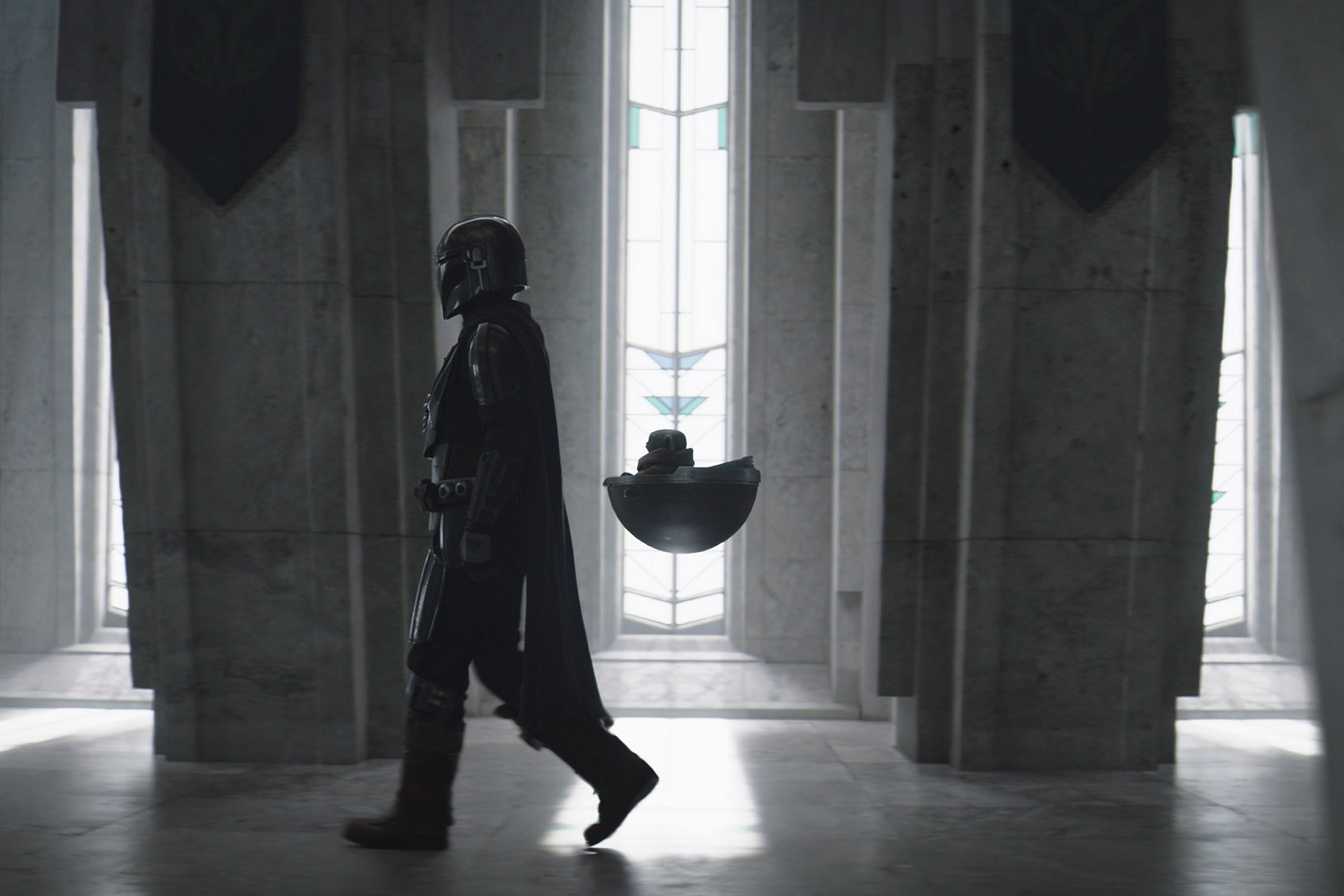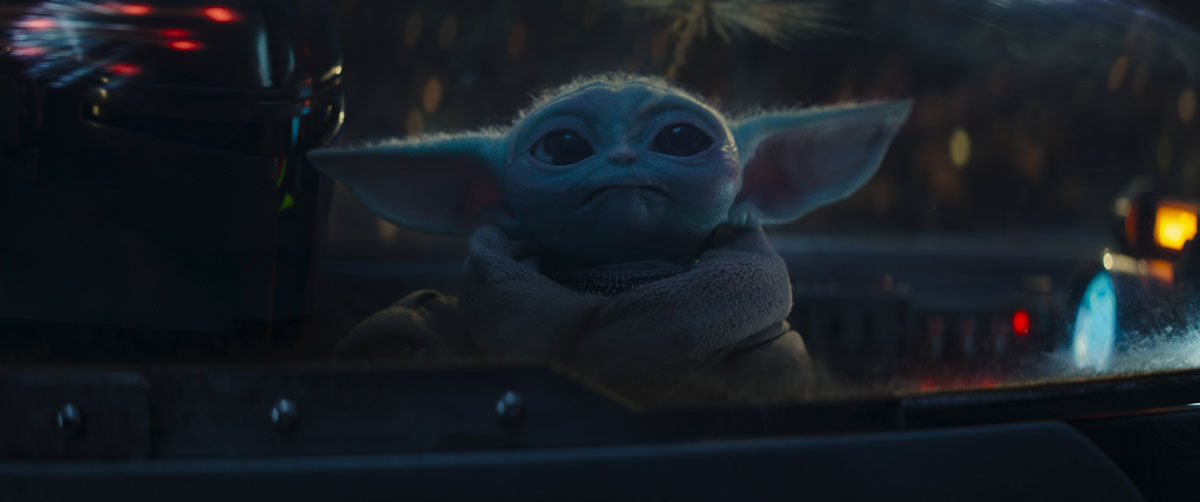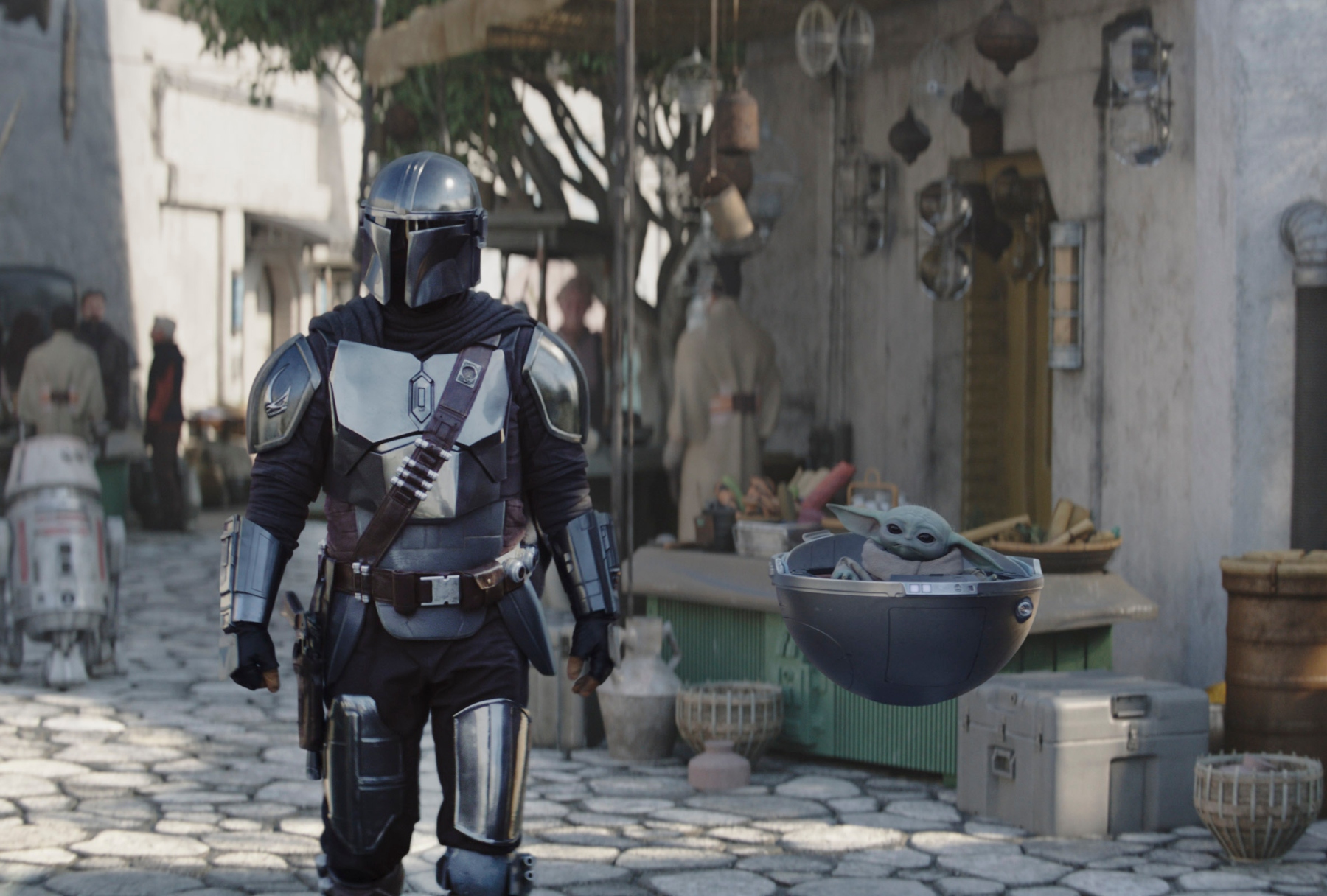Sometime in the first episode of the new season of “The Mandalorian,” I noticed it, what I hadn’t been noticing. Mando (Pedro Pascal) parks his ship, and the trusty Mandalorian and his feisty sidekick Baby Yoda emerge and hit the town, whatever planet the town happens to be on. And when Grogu gets out of the ship, he gets in his protective floating carriage. He’ll ride in it for awhile.
The pod of Baby Yoda is so ubiquitous, it has its own song. It’s an unmistakable image of the Disney+ show: Mando in his silver armor and face-shielding helmet and Grogu bobbling along, behind or beside with his own gleaming protective hovercraft. There are countless YouTube tutorials on how to make your own. The pod is nice-looking and beloved. It serves a practical purpose and is useful for both Grogu and Mando, who otherwise might be carrying the child. But for the millions of Americans like me who are physically disabled, Baby Yoda reminds us of something else too: that we can be disabled at any point, at any age and what our bodies can do may vary from day to day, or hour to hour.
The far far away galaxy of “Star Wars” is no stranger to disability and to disabled characters, but as is too common in fiction, most of them are villains, like Darth Vader. Ada Hoffman writes, with Vader “‘Star Wars’ gave us one of the most memorable disabled characters ever. But it also consistently uses disability in ways that cause problems. Missing limbs and prosthetics are a shorthand for moral dissolution; disfigurement is a sign of evil.”
 Din Djarin (Pedro Pascal) and Grogu in “The Mandalorian” (Disney+/Lucasfilm Ltd.)In floats Baby Yoda. The Child is loved, and though the their intentions may not as yet be totally clear, Grogu has been an obvious win for audiences, long before we even knew the name Grogu (which is probably his least-loved quality, if we’re searching for something). People adore Baby Yoda and people accept, without question, without grumbling on social media, that sometimes Grogu walks and sometimes he rides in his carriage.
Din Djarin (Pedro Pascal) and Grogu in “The Mandalorian” (Disney+/Lucasfilm Ltd.)In floats Baby Yoda. The Child is loved, and though the their intentions may not as yet be totally clear, Grogu has been an obvious win for audiences, long before we even knew the name Grogu (which is probably his least-loved quality, if we’re searching for something). People adore Baby Yoda and people accept, without question, without grumbling on social media, that sometimes Grogu walks and sometimes he rides in his carriage.
This is a key aspect of many disabilities that the non-disabled can find hard to accept in real life. Why can I hear some words at some times and not others, sometimes in the same environment or via the same person talking? It varies. It can have to do with how tired I am, how much of a headache I have from listening fatigue, how a person is mumbling or enunciating or if there are fans or other background noises. It can have to do with a lot of things. In the same way, a wheelchair user may walk or stand at some points or for some periods of time but not others. A body gets tired. A body, perhaps especially a disabled one, has good days and bad days.
If you’re disabled, you only get so many spoons per day, and some days, you have to use them all up to fight Count Dooku.
The important way that “The Mandalorian” uses Baby Yoda’s pod, with the exception of when it was first created and later restored, is that it’s unremarked upon. No one makes a big deal out of The Child getting in or out of it. It just is, an assistive device used sometimes, when the user needs it. In Season 3, Greef Karga (Carl Weathers) makes a bigger fuss about The Child’s name (“If you say so.”). In this way, “The Mandalorian” may be taking a page from earlier “Star Wars” lore. The original Yoda utilizes a cane, beautifully and catchily immortalized in the Bad Lip Reading song “My Stick!”
In some scenes, in some stories, Yoda uses his stick a lot, leaning heavily on it, seeming to need it in order to walk. At other points, like in “Episode II: Attack of the Clones,” Yoda does flips, spins and mid-air kicks. An extreme example, perhaps, but not that different from my disabled friends who sometimes have the energy to go for a walk and sometimes, to use the now-familiar metaphor for chronic illness, are all out of spoons. As The Washington Post explains it, “each spoon represents a finite unit of energy . . . Spoon theory has become a shorthand for chronically ill people to explain how they’re feeling and coping day-to-day.”
If you’re disabled, you only get so many spoons per day, and some days, you have to conserve them and use them all up to fight Count Dooku.
 Grogu in “The Mandalorian” (Disney+/Lucasfilm Ltd.)But cane-user Yoda is also depicted as quite old when we first meet him. In Baby Yoda, I can finally see that most rarest of characters: a portrait of young disability. As a disabled person, we’re desperate for it. Most disabled characters in TV and film (who are overwhelmingly created by non-disabled writers and directors) are stereotypes, overwrought, inspirational and disposable. For all its praise, “The Last of Us,” for example, has failed to introduce a disabled character not just to kill them.
Grogu in “The Mandalorian” (Disney+/Lucasfilm Ltd.)But cane-user Yoda is also depicted as quite old when we first meet him. In Baby Yoda, I can finally see that most rarest of characters: a portrait of young disability. As a disabled person, we’re desperate for it. Most disabled characters in TV and film (who are overwhelmingly created by non-disabled writers and directors) are stereotypes, overwrought, inspirational and disposable. For all its praise, “The Last of Us,” for example, has failed to introduce a disabled character not just to kill them.
Gaslighting is familiar to anyone with an invisible disability.
As someone born with physical disability, especially one like deafness which is so often and incorrectly only assigned to the elderly, I’ve experienced many comments of disbelief, from “you’re so young” to “you don’t look deaf.” That gaslighting is familiar to anyone with an invisible disability. And as about 1 in 5 American adults have long COVID, according to the CDC, more people will unfortunately become familiar with it.
Want a daily wrap-up of all the news and commentary Salon has to offer? Subscribe to our morning newsletter, Crash Course.
Of course, perhaps Grogu has no disability at all. Maybe Baby Yoda is just a baby who sometimes needs a stroller and sometimes can walk (some adults love to mock children for that too, not understanding that disabled children exist). Grogu is 50, which was a weird thing to find out early on in the series, but his species likely ages and matures differently. And whenever and however The Child grows, he will still be shorter than most characters, as Yoda was.
“The Mandalorian” also deals with disability in other ways, including language. Sometimes Mando can understand Grogu and sometimes not, but the two find their ways to communicate. With a whole galaxy full of all kinds of species, respecting personhood (even if one is not precisely a humanoid type of person) and body autonomy is huge in the show. When Grogu attempts to pick up the tiny Anzellan Droidsmiths without their permission, The Child is strongly reprimanded, “No squeezie.” That’s a lesson of respect many adults still need to learn.
Read more
about disability


